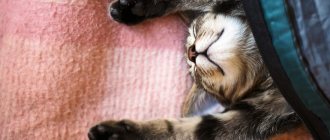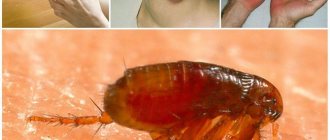Animals, especially pets, bring us so much joy and pleasant moments in life. This is especially true for cats. We love their purring, playing, or simply stroking their soft fur with our hands. And it would seem that children experience the greatest pleasure from communicating with furry friends. However, cats are famous for their capricious nature and can sometimes bite or scratch. Even the most peaceful creature can be thrown out of balance by something, and then a bite or claw mark remains on the skin. What to do if bitten by a cat? How dangerous is a cat bite? And is it worth sounding the alarm if a child is bitten by a cat? How can you recognize the signs of rabies and what are the consequences of such a bite? These questions are quite pressing for those who keep furry pets or encounter them in everyday life. Therefore, this article will help answer them.
Why are cat bites dangerous?
Cat bites can provoke severe infectious processes that affect the skin and fatty tissue. The danger also lies in infection with viruses, the worst of which is the pathogen that contributes to the occurrence of rabies. This disease inevitably leads to death.
A cat bite can cause deep tissue infection
The saliva of a pet contains a large number of bacteria, which during a bite get deep into the tissue, since the cat’s teeth are long and sharp. Pathogenic microflora provokes the appearance of purulent processes, which lead to edema and the formation of infiltrates. If you do not consult a doctor in time and do not carry out antiseptic treatment, the infection spreads to surrounding tissues, increasing the risk of dangerous complications for a person’s life.
A cat bite can lead to serious inflammation
In addition, there is a high probability of damage to nerve endings during a bite, which will provoke a further deterioration in the mobility and sensitivity of the limbs. If after an incident with a cat you feel numbness in the skin, it is recommended to immediately go to the emergency room.
Attention! Cat bites that do not heal for a long time indicate a serious infectious process in the tissues.
What happens if a cat bites - video
A 49-year-old man died after being bitten by a domestic cat.
A 49-year-old man died of rabies after being bitten by his beloved cat. The tragedy occurred in Dankov. The animal disappeared for several days in the winter, and when it returned, the man decided to give it a bath. While bathing, the cat bit its owner. The man died in May of this year. However, the exact cause of his death was established last week, when the laboratory test results were ready. Neighbors of the deceased say that the man did not pay attention to the cat bite and did not get vaccinated. Only in the spring of this year he went to the district hospital for a completely different reason - a boil appeared on his leg. The disease was cured, but when the man was about to leave the hospital, his health deteriorated sharply. They did tests and discovered he had rabies.
“We had such a patient,” he confirmed . O. the head physician of the Dankov interdistrict hospital, Yuri STukalov , - the doctors suspected that the man had rabies. He said that a few months ago he was bitten by a pet. Unfortunately, it was no longer possible to take tests from the cat.
At the Dankovskaya station for combating animal diseases they explained that the man did not bring the cat to them for examination.
“The cat died at his house back in the winter, we didn’t see her,” commented the OGBU “Dankovskaya SBBZH”. “When people suspect that an animal is rabid, they call us, we go to the place and place it in isolation for 10 days. This can be done without even taking the animal away. In a private home, the animal can be left in the utility room for disinfection and treatment. If the owner does not have such conditions, we take the animal; we have our own isolation ward.
As doctors explained, if a person is bitten by a sick animal or its saliva gets on the wound, this does not mean that he will get sick.
“It all depends on the location,” said the OGBU “Dankovskaya SBBZh”. - If an animal bites a person in the face, the count can go on for hours, if in the arm or leg, there is more time - about 48 hours to get vaccinated. Rabies is a selective disease; not every person who is bitten by a rabid animal becomes ill. If saliva gets on a wound, there is little chance of infection, since the virus quickly dies in the environment. But rabies is a disease with a 100% fatal outcome, don’t risk it, go to the clinic.
Let us remind you that in March of this year, a 15-year-old girl from Yelets died after contracting rabies from a dog bought at the market in December. The girl felt unwell only after two and a half months; on March 21 she was hospitalized, and on the 24th she died.
GOOD TO KNOW
The first symptoms of rabies in an animal are inappropriate behavior. It can be both oppression and aggression. Usually in dogs it manifests itself in the form of aggression, and a domestic cat, on the contrary, can hide behind the sofa. The main indicative symptom is that the animal refuses water.
If symptoms appear, you need to call specialists from the veterinary hospital. They will come to your home, examine the animal and, if necessary, place it in quarantine for 10 days. Under no circumstances should you self-medicate. Is it dangerous. If an animal is bitten or salivated, it is necessary to immediately wash the wound or salivation site with warm water and soap to wash away the pathogen that has entered the wound (on the skin, mucous membranes) with saliva. Do not suck blood under any circumstances.
If an animal bites its owner, the person needs to go to the clinic at their place of residence. It is necessary to administer the medicine in the first 48 hours, then the person will not get sick. Rabies vaccinations for people and animals are provided free of charge. In medical practice, a vaccine and rabies immunoglobulin are used, which practically do not cause complications. Pregnancy is not a contraindication for a course of therapeutic and prophylactic immunization.
Even if a person did not manage to administer the medicine in the first 48 hours, one should not refuse vaccination - this is a conditional time and it is individual for everyone.
The incubation period of infection is about 1.5 years. Therefore, if a person does not seek help in time, it can live in the body for quite a long time and not manifest itself.
First aid
What to do first:
- Rinse the wound under cool water for 5–10 minutes. Then treat the bite site with laundry or tar soap. After one minute, rinse thoroughly.
- Soak a cotton pad in hydrogen peroxide, Miramistin or Chlorhexidine. After this, treat the affected area and rinse again under cool water.
- The edges of the wound should be lightly lubricated with iodine or brilliant green; alcohol can also be used for these purposes, but under no circumstances should the bleeding surface be treated with the listed agents.
- At the last stage, you need to apply a bandage using a wide bandage.
Hydrogen peroxide can be used to treat a cat bite wound.
If there is minor bleeding, no measures need to be taken. In this way, all pathogenic microorganisms that could enter with saliva are naturally released. However, if the bleeding is severe, it is recommended to wash the wound according to the algorithm described above and bandage it tightly.
Attention! It is not recommended to apply various healing creams and ointments to a fresh wound. They can only be used after consulting a doctor.
First aid after an incident - video
When to see a doctor
When you need specialist advice:
- with severe bleeding that does not stop after applying a bandage;
- if numbness is felt in the affected area;
- in the presence of a laceration;
- if body temperature rises and general health worsens;
- when severe swelling forms in the bite area.
Severe swelling in the wound area after a cat bite is a reason to consult a doctor
You should also consult a doctor if pulsation is felt in the affected area and the skin becomes warm. In addition, consultation with a specialist will be required if pus and inflammation appear. The doctor will also help if the wound does not heal for a long time.
Attention! Consultation with a specialist is mandatory if the animal is outdoors or hunts rodents.
What to do with the bitten animal itself?
If you are bitten by a street animal or an unvaccinated pet, the worst thing that can happen to the victim is infection with rabies or tetanus. An attacked cat should not be left unattended. It must be caught and placed in a quarantine zone, where specialists will monitor it. If it does not die 10 days after the attack, the animal is considered healthy. Otherwise, it is necessary to begin rabies vaccination aimed at preventing rabies infection. The vaccine is administered to the victim in 1 ml doses on days 1, 3, 7, 14 and 28.
If it was not possible to catch the biting animal and it is impossible to determine whether it suffered from rabies or tetanus, vaccination should begin on the day of the attack. If this procedure is performed correctly, infection does not develop. Otherwise, after the incubation period, the victim of a cat bite will develop rabies.
If there is accurate evidence that the attacked animal was vaccinated against rabies less than 3 years ago, there is no need to be afraid of contracting this infection. Emergency tetanus vaccination is carried out within the next 48 hours after a cat bite. The optimal time for vaccination is the first 6–8 hours after the cat attacked. Vaccination is provided free of charge at the nearest emergency room or hospital.
Treatment for cat bites
Treatment of a wound after a cat bite is complex. In this case, first of all, you should contact a specialist who will administer the vaccine against rabies and tetanus. This measure is necessary if the animal is outdoor or often walks and has contact with other pets, as well as rodents. If the vessels are severely injured, the doctor may recommend suturing the wound.
To speed up the healing of damaged tissues, it is necessary to combine medicinal treatment methods with traditional methods.
Drug therapy
Complex drug therapy can reduce the risk of complications and speed up the healing process of damaged tissue several times. To prevent suppuration, antibacterial medications are most often prescribed, such as: Amoxicillin, Amoxiclav, Ceftriaxone and others. These drugs are used for up to 5–7 days in doses recommended by the doctor and depending on the nature of the wound.
Amoxiclav destroys pathogenic microflora
To speed up healing, Levomekol ointment is also used, which has an anti-inflammatory and antibacterial effect. The drug prevents wound suppuration and is used at least 2 times a day for a week. After lubricating the affected area, it is important to apply a gauze bandage. Also, Vishnevsky ointment is often used for treatment, which quickly relieves the inflammatory process.
Levomekol has an anti-inflammatory effect
At the last stage of therapy, D-Panthenol cream is used, which helps restore the skin and prevents scar formation. It is recommended to use this remedy 2-3 times a day for 10 days. You should not bandage the bite site.
D-Panthenol accelerates tissue regeneration
Attention! Under no circumstances should you cover the affected area with adhesive tape, as this can increase the risk of wound suppuration.
One day my mother was severely bitten by a domestic cat. The wounds were so deep that the hand was swollen. I had to seek help from a doctor who prescribed painkillers and antibacterial agents. The wounds on the arm took about a month to heal, and the treatment was lengthy. The tumor subsided gradually, and the bite marks themselves took a very long time to disappear. It’s good that there were no scars left because my mother used a healing cream.
Folk remedies
Effective folk recipes:
- Tincture of calendula. It is best to purchase it in a pharmacy in ready-made form. This product can be used to treat the edges of the wound, but not the bite site itself. Calendula has an antibacterial effect and eliminates the inflammatory process. It is best to treat fabrics using a cotton swab 2 times a day for 3–4 days.
- Chamomile decoction. You will need 2 tbsp. l. dry raw materials, which need to be poured with 400 ml of boiling water and boiled over low heat for 20 minutes. Then let it brew for another hour. Then filter the liquid through gauze and use it to wash damaged tissues 2 times a day for a week. This remedy will speed up the healing process and prevent suppuration.
- Sage tea. You will need 1 tbsp. l. raw materials, which needs to be poured with 300 ml of boiling water and left for 2 hours. Then strain the liquid and use it to wash the bite site 2-3 times a day for a week. The infusion has an anti-inflammatory effect and produces an antiseptic effect.
Attention! Traditional methods of treatment do not replace drug therapy, so these remedies can only be used in combination with medications.
Ingredients for traditional medicine recipes - photo gallery
Calendula tincture has an antibacterial effect. Sage has an antiseptic effect.
Chamomile eliminates inflammation
Prevention measures
Prevention rules:
- Be careful when playing with cats. Try to avoid bites and scratches.
- Do not touch street animals unless you are sure that they are friendly. If a cat hisses, then you should not tempt fate.
- If your pet bites you, you should immediately wash the wound with soap and treat it with any antiseptic.
- At the slightest suspicion of an inflammatory process, immediately consult a doctor.
- Do not try to heal deep wounds after a bite yourself.
- Be sure to get vaccinated against tetanus. Such an injection will protect against a terrible disease that can be transmitted by an animal, especially a stray one.
- When playing with your pet, do not expose your face to it.
Attention! You should never try to separate two fighting cats with your bare hands, otherwise you may suffer serious injuries.
Wounds after a cat bite do not always go away on their own and in about 40% of cases such incidents provoke the development of an infectious process. It is important to immediately treat the damaged surface to reduce the risk of consequences. If the cat is not a domestic cat, then it is imperative to seek the help of a specialist.
Possible complications
The most dangerous complication that can occur after an animal bite is blood poisoning. This is possible when the infection gets into the deep layers of tissue. Sepsis can be fatal, so neglecting treatment is not recommended. Another serious complication is infection with tetanus and the rabies virus. Both pathologies are not amenable to therapeutic correction. In addition, tendons and muscles may be injured, resulting in limited motor activity of the affected limb.
Attention! With advanced purulent processes, mandatory drainage and rinsing of the cavity is required. To avoid such a consequence, it is important to begin antiseptic treatment immediately after the incident.











